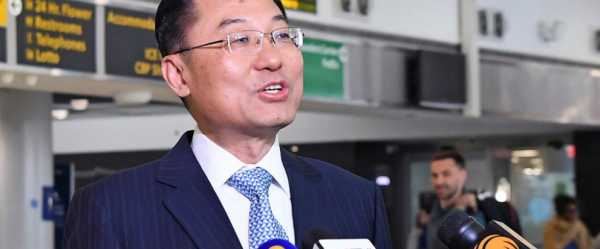
China does not want a trade war with the United States but will retaliate against any further U.S. restrictions on technology and trade, the Chinese ambassador to the U.S. said.
Ambassador Xie Feng criticized U.S. curbs on the sale of microchips and chipmaking equipment to China that were imposed last year by the Biden administration. Beijing has described the measure as part of an effort to “contain” China.
“China does not shy away from competition, but the definition of competition by the U.S. side I think is not fair,” Xie said Wednesday at the Aspen Security Forum, a security and foreign policy conference in Aspen, Colorado. “The United States is trying to win by keeping China out,” he said, referring to measures to curb U.S. technology sales to Chinese telecommunications giant Huawei over security concerns.
“This is like restricting the other side to wear outdated swimwear in a swimming contest while you yourself (are) wearing a Speedo,” he said.
China earlier this month imposed export curbs on two key metals used in computer chips and solar cells, a measure widely seen as retaliation for the U.S. restrictions on microchips. Earlier this year, Beijing restricted sales of products from Micron Inc., the biggest U.S. producer of memory chips.
“Definitely it’s not our hope to have a tit for tat,” Xie said. “We don’t want a trade war, technological war. We want to say goodbye to the Iron Curtain, as well as the Silicon Curtain.”
Xie’s comments come as Washington and Beijing are trying to patch up their relationship, which has hit new lows in recent months over a slew of issues including a suspected Chinese spy balloon that flew over U.S. territory and tensions over trade, technology, human rights and China’s claim to Taiwan and much of the South China Sea.
As part of efforts to mend ties, three top U.S. officials visited Beijing in recent weeks. John Kerry, the U.S. special envoy on climate, concluded talks on Wednesday with Chinese officials on ways to combat climate change and restore high-level cooperation between the two countries.
He was preceded earlier this month by Treasury Secretary Janet Yellen. Last month, Secretary of State Antony Blinken traveled to China on a visit focused on reopening communication channels between the two countries and reviving stalled talks between their militaries.
Xie said China is “eager” to have a “stable, healthy relationship” with the U.S.
He said immediate “concrete” improvements could include increasing the number of passenger flights between China and the U.S. — which were heavily curtailed during the pandemic — and renewing the countries’ cooperation agreement on science and technology.
On the issue of the Ukraine war, Xie reiterated Chinese officials’ talking points that Beijing respects countries’ sovereignty and territorial integrity but also acknowledges “legitimate and reasonable security concerns.” China bills itself as neutral in the conflict, but in practice it has shown Russia support by organizing frequent state visits and joint military drills with Moscow.
On the issue of self-ruled Taiwan, which China considers a breakaway province, Xie said the “priority” is to stop the upcoming trip to the U.S. of Taiwanese vice president and presidential front-runner William Lai.
The visit, expected as part of a trip next month by Lai to Latin America, is like a “gray rhino charging at us,” Xie said.
China opposes any formal exchanges between its diplomatic partners and Taiwan and has reacted angrily to such visits in the past. In April, China conducted war games around Taiwan after Taiwanese President Tsai Ing-wen met with U.S. officials in Los Angeles while on her way back from Central America.
The director of the U.S. de facto embassy in Taiwan, Sandra Oudkirk, said Wednesday there is “absolutely no reason” for China to use Lai’s transit “as a pretext for any sort of provocative action.”
Sourse: abcnews.go.com






